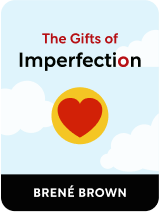

This article is an excerpt from the Shortform book guide to "The Gifts of Imperfection" by Brené Brown. Shortform has the world's best summaries and analyses of books you should be reading.
Like this article? Sign up for a free trial here .
What does it mean to find meaningful work? How does your work contribute to your self-worth? How can self-doubt get in your way?
One of Brené Brown’s steps for living Wholeheartedly is to find meaningful work in your life. Whether this is a paid job, or being a stay-at-home-mother, finding work that makes use of your gifts and talents will make you feel fulfilled and happier in life.
Continue reading to learn more about meaningful work and how to overcome the barriers to achieving it.
Finding Meaningful Work
One strategy for finding happiness and living Wholeheartedly is finding meaningful work. In Brown’s view, meaningful work is work that enables you to use your gifts and talents. This work might be paid work (although Brown acknowledges that finding a job that perfectly fits your skillset is difficult). However, it doesn’t have to be: Meaningful work can be anything from parenting, to volunteering, to engaging in a hobby.
According to Brown, failing to find meaningful work that uses your gifts and talents can trigger numerous negative emotions, like shame and anger. In contrast, finding meaningful work can provide such benefits as increased happiness and fulfillment, increased sense of purpose and, if you’re spiritual or religious, a feeling of being closer to your higher power.
(Shortform note: Brown doesn’t fully explain how finding meaningful work can increase your sense of connection to a higher power, but her discussion suggests that this connection deepens because, through your meaningful work, you’re making the most of the gifts and talents that this higher power gave you and fulfilling its purpose for you.)
| Meaningful Work and Worthiness In this section, Brown doesn’t explicitly address how finding meaningful work that uses your gifts and talents (or not doing so) can impact your worthiness. However, she implies that not finding meaningful work affects your worthiness negatively. By not incorporating your talents into your daily life through such work, you may believe that you’re not contributing your full potential to the world, making you feel a sense of worthlessness. Conversely, each time you engage in meaningful work, you’ll be reminded that you’re good at something: the gift or talent that this work uses. This will increase your sense of worthiness. |
| An Alternative Perspective on Defining and Finding Meaningful Work Brown isn’t the only author to try to define what makes work meaningful. For instance, in Outliers, Malcolm Gladwell argues that meaningful work must have three components: It must be complex: for instance, involve enough tasks of a varied enough nature to be intellectually and creatively engaging. It must give the worker autonomy: in other words, control over what they do. There must be a clear positive correlation between hard work and reward: In other words, the harder a person works, the greater their reward must be. In Gladwell’s view, even work that we might assume to be tedious—for instance, working in a manufacturing plant, producing the same plastic items every day—can bring happiness and fulfillment if it incorporates these three elements. In The Gifts of Imperfection, Brown states that Gladwell’s concept of meaningful work is compatible with Wholehearted Living. However, it’s worth noting that the two authors’ definitions of this type of work differ. For instance, Gladwell doesn’t mention using your gifts and talents as a key component of meaningful work, while Brown does. Furthermore, Gladwell mainly discusses meaningful work in the context of paid employment. In contrast, Brown presents meaningful work as any work that brings you meaning—paid or otherwise. |
Barriers to Engaging in Meaningful Work
During her discussion of meaningful work, Brown touches on a major barrier you may face when trying to engage in it: self-doubt.
Self-doubt can take many forms. Brown notes that some people doubt they have gifts and talents that are “good enough” to use in meaningful work. (For example, you might believe that you’re better than average at cooking, but not good enough to become a professional chef.) Others doubt that they have any gifts and talents at all. These self-doubtful attitudes hinder meaningful work because if you don’t believe you have gifts and talents that are worth using, you won’t try to find meaningful work that uses them.
Another common doubt is wondering whether pursuing paid meaningful work is the “right” choice, particularly if such work is low-paid or carries little prestige. You might worry that people will look down on you for engaging in such work, even if it makes you happy.
In Brown’s view, a powerful way to overcome these self-doubts is to first, accept that they exist: We can’t address things that we don’t acknowledge. Then, commit the doubts to paper: Write them out in full.
Brown believes that writing your doubts down will give you a clear opportunity to challenge them and remove their power over you. To challenge the doubt that you have any gifts or talents, you might ask yourself why you feel like you’re talentless. Is it because a bully once told you so? If so, why should you listen to that bully? They weren’t telling the truth—they were just trying to hurt you. In all likelihood, you do have gifts and talents that the bully simply chose to ignore.
| Other Strategies for Overcoming Self-Doubt In addition to Brown, many other authors have tried to answer the question of how to combat self-doubt. For example, in The Secret, Rhonda Byrne suggests replacing self-doubtful thoughts with positive ones such as “I can do this.” In the context of finding meaningful work, you might say to yourself, “I do have gifts and talents that I can channel into meaningful work,” or “My meaningful work is worthy and worth doing, regardless of how much it pays.” Jen Sincero, author of You Are a Badass, also cites replacing negative thoughts as an effective strategy to combat self-doubt (as well as other unhealthy thought patterns like guilt and self-loathing). Other strategies she suggests include repeating positive, self-praising affirmations and avoiding using self-deprecating humor. For instance, if you constantly joke with friends that you’re talentless or have no gifts, stop doing this—the “jokes” are probably negatively affecting your confidence more than you think. Finally, Sheryl Sandberg, Facebook COO and author of Lean In, suggests reminding yourself of your past achievements when you feel self-doubt creeping in. This will challenge your belief that you can’t succeed or that you’re talentless. If you doubt that your talent is “good enough” to use in meaningful work, you might remind yourself of a time when you used it successfully—for example, a talented singer might remind themselves of a time when they performed and received positive feedback. |

———End of Preview———
Like what you just read? Read the rest of the world's best book summary and analysis of Brené Brown's "The Gifts of Imperfection" at Shortform .
Here's what you'll find in our full The Gifts of Imperfection summary :
- How to stop feeling like you're not "good enough"
- How shame affects your self-worth
- The 10 guideposts to living Wholeheartedly and cultivating worthiness






